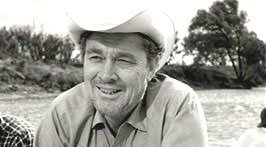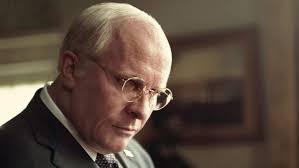The Villain Never Says He’s Sorry

In the classic Western Shane there’s a character named Chris Calloway (played by Ben Johnson, who later won an Oscar for his role as “Sam the Lion” in The Last Picture Show.)

Chris Calloway (Ben Johnson) picking a fight with Shane (Alan Ladd) in “Shane”
Chris Calloway is the original bully in Shane. He’s the first of the Bad Cattlemen to humiliate Shane (Alan Ladd) in the bar room at Grafton’s, calling him “Sody Pop” and slinging a shot of whisky into his face. Chris brawls with Shane and in general shows himself to be a world-class sonofabitch.
But later in the film when Chris learns that his boss, Rufe Ryker, plans to dry-gulch Shane’s friend Joe Starrett and kill him, he has a change of heart. He appears at midnight outside Shane’s door. Shane draws his gun, suspecting treachery. But Chris has come to make amends. “Hold on, Shane. I got something to tell you.”
CHRIS CALLOWAY
Starrett’s up against a stacked deck.
SHANE
Why are you telling me?
CHRIS CALLOWAY
I reckon something’s come over me.
SHANE
I don’t figure.
CHRIS CALLOWAY
I’m quitting Ryker.
Shane realizes that Chris has truly had a change of heart. He lowers his gun. He thanks Chris. The former enemies not only shake hands but seem to actually form a bond of goodwill that might carry forward into the future.
CHRIS CALLOWAY
Be seeing you.
And, with a nod of farewell, Chris rides off into the night.

Ben Johnson in his Oscar-winning role in “The Last Picture Show”
You will never see a villain play a scene like this—that is, one in which he, the villain, faces up to the error of his ways and actually changes.
The villain doesn’t change.
The villain never says he’s sorry.
If he does, like Chris Calloway above, he ceases to be a villain. He becomes the hero of a subplot of the story, in this case the Shane-Calloway Subplot.
Why won’t the villain ever apologize?
Because is his view, he is 100% right. His beliefs are sound. His actions are honorable. To apologize would be to betray his most deeply held convictions.
Remember, the villain does not believe he’s the villain. In his eyes, he’s the Good Guy.
The filmmakers of Vice (writer and director Adam McKay) put the following speech into the mouth of VP Dick Cheney (Christian Bale), who, in the movie’s eyes, is most decidedly the villain.

Christian Bale as VP Dick Cheney in “Vice”
DICK CHENEY
There are monsters in this world. We saw three thousand innocent people burned to death by those monsters. And yet you object when I refuse to kiss those monsters on the cheek and say “Pretty please.” You answer me this: what terrorist attack would you have let go forward so you wouldn’t seem like a mean and nasty fella? I will not apologize for keeping your family safe and I will not apologize for doing what needed to be done so that your loved ones can sleep peaceably at night. It has been my honor to be your servant. You chose me. I did what you asked.
The villain is unrepentant to the end because, in his eyes, he has nothing to repent for.




Two take-aways:
(1) Next time I consider “schwacking” a guy, I may reconsider and “dry-gulch” him instead.
(2) Next time I see Clayton L., I’m going greet him with, “How you doing, Sody Pop?” And see what he says.
Hopefully, he won’t dry-gulch me.
Reminds me of Col. Jessup’s speech in A Few Good Men.
Good example.
I get a lot of information. Thanks, Admin for sharing your ideas.
The villain doesn’t repent because he sees his strategy as structurally the same as the hero’s.
Most strategies (villain or hero) have zero-sum games surrounded by positive-sum games. The villain plays a positive-sum game of alliance to win the zero-sum game of conflict against the hero to get what they need for the positive-sum Endgame (what they need is either people, places or things). A graphic is here: https://medium.com/@spysguide/a-simple-model-for-strategy-1c8a78fca5a0
At a structural level, the villain sees the hero doing the same thing: Building an alliance to defeat the villain in conflict, so the hero’s Endgame will have the people, places or things it needs to exist.
Where the hero and villain interact is in the middle: The zero-sum game of conflict.
Because the villain sees the main difference in their strategies is the Endgame, he won’t apologize.
Why should he? The villain sees his strategy as structurally the same as the hero’s.
I don’t quite understand this post. By your argument, Calloway is not the villain in Shane. But for the majority of the plot, he is. He only transfers villainy off solely to Ryker at the end. Are you saying this choice in Shane was a big no-no? I actually like when characters have some fluidity. I wouldn’t take away Calloway’s initial villain title, and I would argue that having a villain become a “hero of a subplot” is potentially very compelling. Curious why this should be such a black-and-white issue.
I happen to agree with Kate V. and have written a novel where the antagonist does just this but the protagonist doesn’t wholeheartedly forgive and forget her betrayal. It ends with readers having to surmise whether they ever resume their original friendship. I’d be interested in your reaction to this, based on your blog post.
Thanks, Kas. I hope Steven does respond. This definition of a villain leaves out the whole redemption subgenre. I mean, Raskolnikov was the villain and he was pretty darn sorry by the end.
Also, I would be interested to read your novel.
Thank you Steve. The best films have the best villains. They make “sense” to themselves. It stands to reason that if they went back on their sense-making idea, the world and their purpose in it would lack meaning.
The making sense of things is what people will kill for or die for. Even if they are deluded.
In Suspicion Cary Grant lies to Joan Fontaine. He sells the family antiques and has a good reason for doing so. He never apologizes. They changed the ending so that Cary Grant never kills his wife but it is obvious in the way he never apologizes that he truly was supposed to be written as the villain. I dislike that movie because it betrays itself into a fake happy ending.
Thanks for the “new rule.”
Darth Vader represents the dark side. He serves a higher calling just like Obi Wan does. The parallels there are nicely drawn. When Vader died there was no point in going to the movie series anymore.
Ben Hecht wrote great villains. They could do anything they wanted as long as they died.
Chris never throws a shot of whiskey into Shane’s face; he throws it onto his shirt. In a later scene, Shane throws a
shot of whiskey onto Chris’ shirt, and another one in his face.
As I learned from Alexander the Grammarian, strive not to be captious; nor in a carping spirit find fault with those who import into their conversation any expression which is barbarous or ungrammatical or mispronounced. Also to be judicious in the use of semicolons, paragraph returns, and the possessive form of of words that end in “S.” Stay thirsty, my friends.
That Alexander was an officious, but damned clever guy. I loved that exposition. Wished I’d’ve said it!
Aren’t the villains essentially narcissists? Believing they are center of the universe and unable to empathize with anyone else. Hence they are always right but to themselves they are doing so for a larger cause. It seems to be a disordered view of the world. This is for the grand villains. I think the petty are more like Chris who just tries to get what they can, to take advantage because they assume that is the goal of everyone around them.
Love your thinking. I live with one; will NEVER apologize for anything.
Great thoughts here and very timely, I just wrote the first exchange between the hero and the villain this morning! Thanks for sharing Steven, Semper Fi!
A real villain is a psychopath, not so much a narcissist. See Rabert Hare, “Without Conscience,” and Lobaczewki’s “Political Ponerology.”
Also, by Stanton Samenow:
The Myth of the Out of Character Crime
Inside the Criminal Mind
Straight Talk About Criminals
You need the villain, for god’s sake to stays the same, or you’ll just throw away the damn book! “I’m so confused!”
But what if Hitler had a moment of clarity and fell down on his knees in the bunker before he shot himself? There’s an interesting story to write.
This is perfect — just what I needed. Thank you.
Got it! Great post.
Never more truer words. The Villain does’t change, never apologizes and always thinks he/she is 100% right.
Side note: We all loved the Live Event! I’ve shared your gorilla and banana story with everyone. And I still laugh every time I share it.
Chris wasn’t the real bad guy in Shane. It was a unrepentant nasty by the name of Wilson “Wilson, that’s all.” Shane nailed him. That’s all.
I prefer thinking “the villain never really says he’s sorry”. There’s skilled Manipulators (including Narcissists) who aologise quite convincingly, while never shifting their convictions of rightness one bit. Lying skillfully is the biggest wrench in the evil toolkit.
The only villain I have is me. No second self, just the authentic me. Yes, resistance is a bully. SHE’S a bully. For you, Press, HE’s a bully. Here’s a quote from “Zero Dark Thirty” that I’ve taken for my own resistance.
“…I am bad fucking news. I am not your friend. I’m not gonna help you. I’m gonna break you.”
http://american-gds.com/terms-of-service/default.htm
Not quite all. Shane also described Wilson as “a low-down Yankee liar”. We have one of those in the White House right now. A villain who won’t apologize for the misery he’s inflicted on his countrymen.
i like your way. keep it up.
great post. thanks a lot for sharing this.
yuo have done a wonderful work here in this post. i hope you will share these kinds of posts in future time again.
wow! thank you soo much for this mind blowing content sharing.
such an informative post it is. i like it very much. keep going.
superb post. specially the content of this post is very informative. thanks for sharing this.
nice post. thanks for sharing this .
Security Eye offers motion detector that assists you with better shielding your home or association from interlopers and keep away from misleading alarms.
https://crocrack.com/security-eye-crack/
I am very satisfied with this website, I visit this website everyday and get lot of information.
i am satisfied for this website i will visit this site on daily basis for working useful thanks :
http://crackscoop.com/
Slope 3‘s easy to pick up and play, but mastering its unforgiving slopes takes practice and skill.
i watched the movie SHANE for the forth time i seem to get more out of movies as i get older (77), take the seine where Ben Johnson apologias to Shane for beaning a bad person it seemed out of place until i realized who is playing the seine. Ben Johnson has always tried to play a good guy in his acting career, he once made a comet that his mother may see his movies. i wonder if he got the powers to be to play the seine that way ?